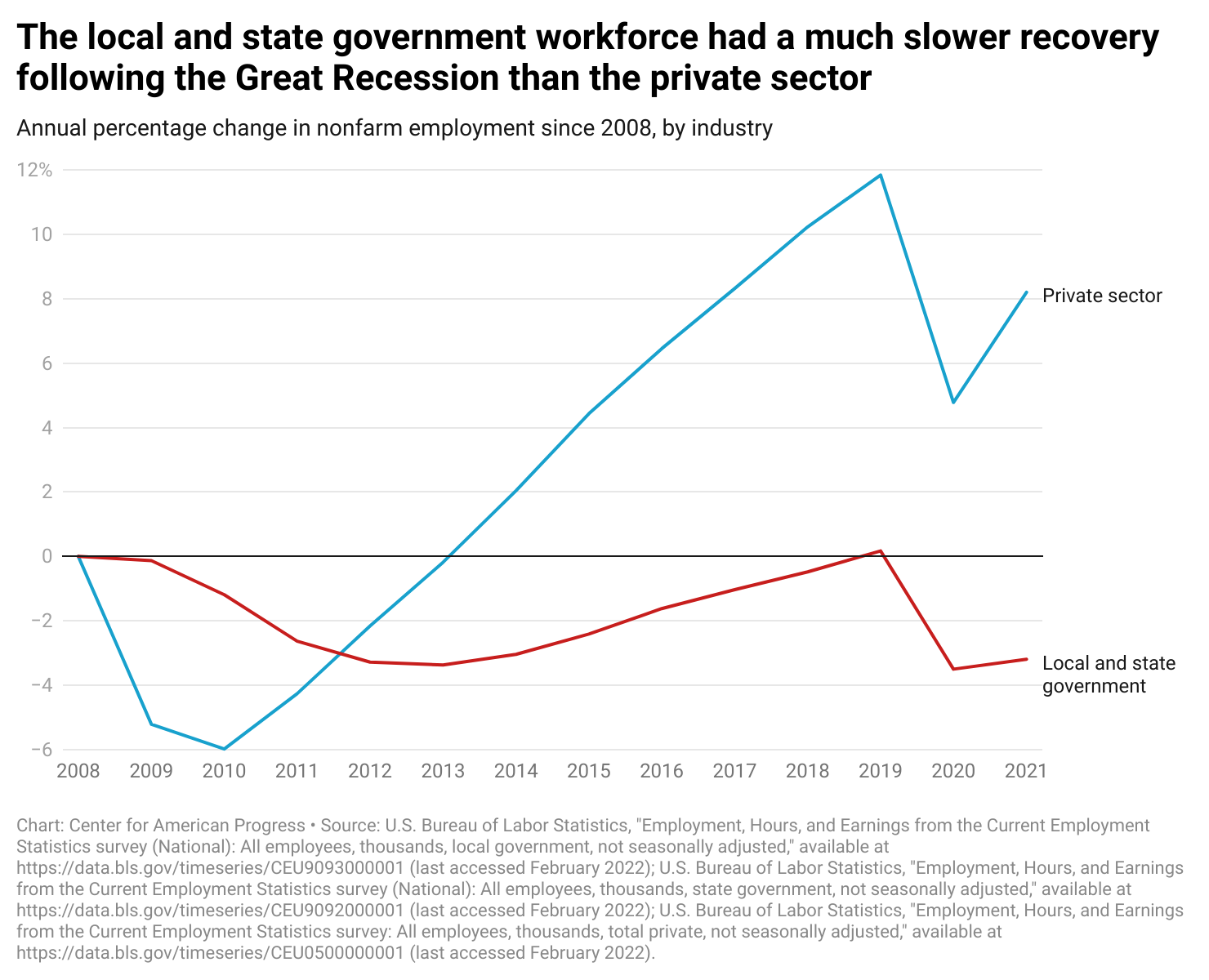Connecting state and local government leaders
Even with billions in federal aid, the state and local workforce isn't bouncing back from the pandemic. Jobs held by many women and people of color are among those with the greatest declines, according to a new analysis.
Even though state and local governments are spending much of their American Rescue Plan Act dollars on operations, the number of public workers nationwide has dropped by nearly 700,000 during the pandemic to a level lower than during the Great Recession, according to a new Center for American Progress report.
Among the positions that have seen the greatest declines include janitors and administrative assistants, jobs that are disproportionately held by people of color or women.
As a result, the left-leaning think tank urged, in the report released Friday, that governments focus on using their federal relief funds on hiring workers. To restore jobs for women and minorities, the group said, states and municipalities should rethink requirements like college degrees, which exclude some people from government jobs. It also urged states and localities to do more to recruit people from disadvantaged communities.
ARPA provided $350 billion to states and local governments to help offset revenue losses and costs from the early days of the pandemic. Despite the influx of money, governments have been “noticeably slower” in restoring lost public sector jobs, the report said.
This “not only affects constituents who directly rely upon their services but also has devastating impacts on the economic security of those most likely to work in these jobs, disproportionately women and workers of color,” the report said.
The group’s conclusions come even though the largest portion of ARPA funding has gone toward maintaining government operations, according to a joint effort by Brookings Metro, the National Association of Counties and the National League of Cities to track how 41 large cities, 104 large counties and seven consolidated city-counties are using the dollars.
About 38% of the dollars budgeted thus far have gone toward government operations, compared to 12.7% being steered toward housing, 12.3% for community aid, 12.2% for public health and 12% for infrastructure.
The jobs created last year and earlier this year should be reflected in employment numbers showing the decline in public sector jobs, said Marina Zhavoronkova, CAP’s senior fellow for workforce development and a coauthor of the study.
As of February, based on federal Current Employment Statistics data, local governments employed 627,000 fewer people than in the same month in 2020, the CAP study said. State governments employed 68,000 fewer people than two years ago.
Public sector jobs recovered much more slowly than private sector ones from the Great Recession and were just getting back to 2008 levels in 2019 when the pandemic wiped out those gains. By last year, the number of public sector employees had dropped again to 3.2% lower than there were in 2008.
Beyond the importance of the work government employees do, the report noted that the number of people employed by state and local governments is significant in terms of equity.
It showed that the majority of state and local government workers are women. In addition, women in 2021 were more likely to rely on state and local governments for jobs than men did. While 15% of employed women worked in the public sector, 9% of employed men worked for the governments.

The Biggest Job Declines
The largest declines during the pandemic, the study said, have come from administrative jobs like office clerks, administrative assistants and receptionists. Last year, local governments employed nearly 46,000 fewer office clerks and nearly 20,000 fewer secretaries and administrative assistants than they did in 2019.
Those jobs were particularly significant for women, especially those who are Black, because it allowed them to make more money for doing the same work than in the private sector, the study said. State governments also employed nearly 9,000 fewer receptionists and information clerks during the same period.
Similarly, local governments are employing significantly fewer janitors and building cleaners, jobs that allow Black and Hispanic men to make more than for doing the same work in the private sector. The study also noted that state governments are employing fewer drivers—nearly one in five of whom are Black men —than just a couple of years ago.
“Many jobs with lower barriers to entry within local and state governments have seen large declines. This is a concern for the economic security of those most likely to occupy these positions," the report said.
Also disappearing are claims adjusters, appraisers and examiners, for which governments have to compete for workers with the private sector despite offering lower pay, the study said. Plus, state governments have lost 8,000 people who do work like adjudicating unemployment claims, the study said. Local governments were also employing 19,000 fewer accountants and auditors than in 2019. State governments are also employing 7,000 fewer people in those professions, which are dominated by women.
The job losses come on top of other hits public workers have taken during the pandemic. Citing a study by MissionSquare, which provides retirement benefits for public workers, the CAP report noted that nearly a third of public sector workers had to take on additional debt, partly because of furloughs instituted by governments at the beginning of the pandemic.
In hiring more workers, the report urged, governments should “reconsider how they attract, hire, and train potential applicants.”For example, the group said governments should think about getting rid of hiring requirements in some cases.
“While some private-sector employers have reconsidered degree requirements, state and local governments are much more likely to require postsecondary education than the private sector, and in some cases, this may be an unnecessary barrier to entry,” the report said, noting the nation’s “persistent racial equity gaps in educational attainment.”
The report noted that Maryland Gov. Larry Hogan announced earlier this month that the state is removing the four-year-degree requirement from thousands of jobs.
In addition, the report acknowledged that many state and local governments do not have enough human resources staff to evaluate their hiring practices. Still, the report urged local governments to work more with community-based workforce development programs to get a more diverse pool of people applying for the jobs.
Kery Murakami is a senior reporter for Route Fifty based in Washington, D.C.

NEXT STORY: The States With the Highest and Lowest Wage Gaps




